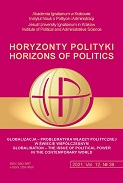Strefa euro a utrata autonomii krajowej władzy polityki ekonomicznej
The Eurozone and the Loss of the Autonomy of the National Power of Economic Policy
Author(s): Paulina Pukin-SowulSubject(s): Politics, Supranational / Global Economy, Economic policy, EU-Accession / EU-DEvelopment, Financial Markets
Published by: Uniwersytet Ignatianum w Krakowie
Keywords: economic integration; Monetary integration; Economic policy; The European Union;
Summary/Abstract: RESEARCH OBJECTIVE: The aim of the article is to present the relationship between the creation of the euro area and the loss of autonomy of the national authority of monetary policy in the Member States of the European Union. Reflection on this issue is an attempt to explain the processes taking place in contemporary relations between politics and economics. THE RESEARCH PROBLEM AND METHODS: The article focuses on the impact of the accession and participation in the euro area on the consequences of the loss of autonomy of the national economic policy. A critical analysis of scientific sources and a case study were used. THE PROCESS OF ARGUMENTATION: The article begins with a sketch presenting theoretical assumptions on international economic integration. Next, the example of the euro area is primarily analyzed. RESEARCH RESULTS: A country joining the euro area is obliged to partially give up its autonomous monetary policy. The final balance of benefits and risks of introducing the euro should also cover other socio economic and political issues. CONCLUSIONS, INNOVATIONS, RECOMMENDATIONS: Before the introduction of the euro in Poland, experts should conduct economic and political analyzes of the benefits and threats of joining the monetary union. Economists should focus, interalia, on on the impact of the loss of monetary policy on the country’s economy.
Journal: Horyzonty Polityki
- Issue Year: 12/2021
- Issue No: 39
- Page Range: 127-140
- Page Count: 14
- Language: Polish

